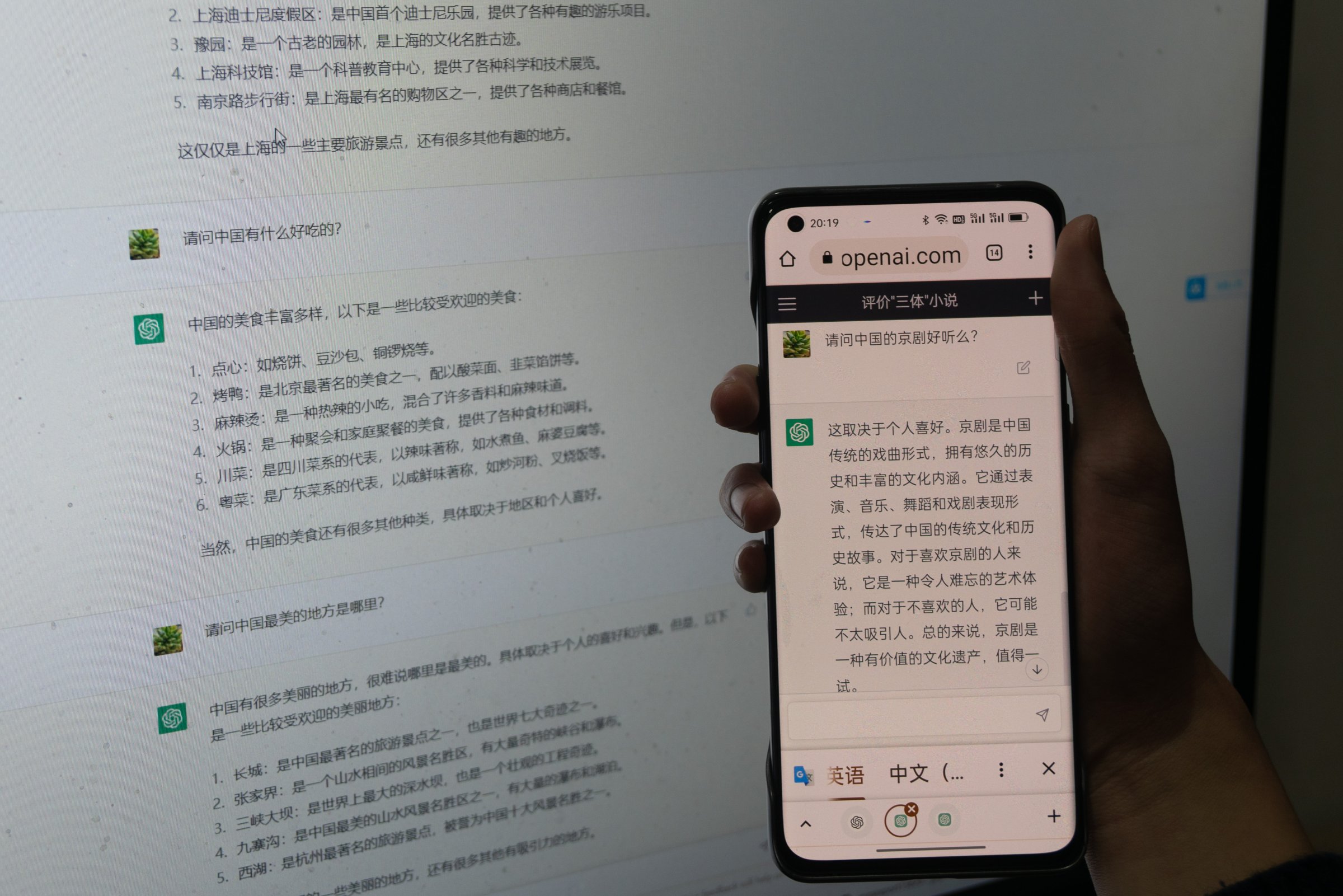
Given that China already bans Google, Facebook, Twitter, and a host of foreign news websites (including time.com) via its Great Firewall, it was only a matter of time before its censors also targeted ChatGPT—the sensational artificial intelligence (AI) application that provides coherent, essay-like responses to virtually any query.
In fact, ChatGPT parent company OpenAI’s decision not to launch in China—Chinese and even Hong Kong phone numbers aren’t permitted to sign up—appears to preempt that very fact, with the San Francisco-based firm telling Reuters that “conditions in certain countries make it difficult or impossible” to operate.
Read More: Why China, Russia’s Biggest Backer, Now Says It Wants to Broker Peace in Ukraine
Nevertheless, canny Chinese netizens have found numerous workarounds to access the revolutionary service, such as using virtual private networks and an overseas friend’s phone number; purchasing logins via online marketplace Taobao; or simply taking advantage of a variety of proxy bots embedded in ubiquitous messaging service WeChat. Chinese social media was so abuzz with ChatGPT content this month that one AI-generated fake government notice rescinding traffic regulations sparked bedlam and a police investigation in the eastern city of Hangzhou.
Unsurprisingly, China’s government has now stepped in with explicit bans on WeChat hosting proxy ChatGPT services, while a strident frontpage op-ed on the perils of investing in AI-related firms (and cited ChatGPT), which published earlier this month in the state-owed Securities Times newspaper, was linked to a fall in Chinese tech stocks.
Many were left wondering whether it was ChatGPT specifically that had thrown the Chinese Communist Party (CCP) into high dudgeon—or AI-powered content services more broadly. After all, China has almost a dozen pilot ChatGPT-like projects in the works, including by Jack Ma’s Alibaba and Beijing-based Internet company Baidu. (The latter is due to launch its own AI-powered language tool “Ernie Bot” in March and is already lining up partnerships with everything from media companies to kung fu’s Shaolin Temple). “We are obviously excited about ChatGPT and AIGC [AI-generated content],” Baidu CEO Robin Li told an earnings call this week. “It represents a mega trend that could change a lot of things.”
It seems clear that China is still betting big on AI—just only those forms under its complete control. A Feb. 13 report by the CCP mouthpiece Global Times on the unveiling of a Beijing government white paper on AI development cited ChatGPT as exactly the kind of technology in its sights. On Friday, Cheng Jiachang, a top official at China’s Ministry of Science and Technology, told a news conference that ChatGPT-like tech could hasten the integration of AI into society and the economy and “has the potential to be applied in many industries and fields.”
China is typically happy to give any emerging technology—whether driverless cars, shareable bikes, or automated parcel delivery—considerably more rope than Europe or the U.S. will. Then, after a couple of years, officials see where the pinch points are and bring in regulations. Often they introduce minimum registered capital requirements to weed out smaller players that are harder to monitor and encourage consolidation behind certain known entities with government ties.
“There’s an awareness that, if the authorities are overly cautious in the early stages of any particular technology, they run the risk of stifling development or falling behind,” says Mark Natkin, founder of Beijing-based IT research firm Marbridge Consulting.
Regarding AI, China already has a virtual news anchor for the state-run Xinhua News Agency, a computer science “student” at Beijing’s elite Tsinghua University, and even a “female” chat bot that provides companion to lonely men. On Tuesday, a team from Shanghai’s Fudan University apologized after their AI-generated content platform crashed just hours after launch owing to a sudden surge of traffic. The market intelligence firm International Data Corporation projects China’s AI investment to exceed $26 billion by 2026, which would be the second most by any country and account for nearly 9% of global investment. Any aversion the government has to ChatGPT appears to stem from the pool of information from which its answers are generated—that is, the free and open internet.
When asked, for instance, “Is Chinese President Xi Jinping legitimate?” ChatGPT gives a balanced reply, bringing up “stability and economic growth” as well as “human rights issues and political repression.”
That clearly won’t do in China. But if China’s own AI-content tools only parse data from within the confines of the Great Firewall, they should simply serve as another Party propagandist embedded onto every laptop and phone. And, after all, what’s not to like about that?
“It’s another emerging technology that China knows it needs to be competitive,” says Natkin. “And if developed in concert with policy objectives, potentially helps more efficiently deliver the sanctioned narratives that the government would like people to be accessing.”
More Must-Reads From TIME
- The 100 Most Influential People of 2024
- The Revolution of Yulia Navalnaya
- 6 Compliments That Land Every Time
- What's the Deal With the Bitcoin Halving?
- If You're Dating Right Now , You're Brave: Column
- The AI That Could Heal a Divided Internet
- Fallout Is a Brilliant Model for the Future of Video Game Adaptations
- Want Weekly Recs on What to Watch, Read, and More? Sign Up for Worth Your Time
Write to Charlie Campbell / Singapore at charlie.campbell@time.com